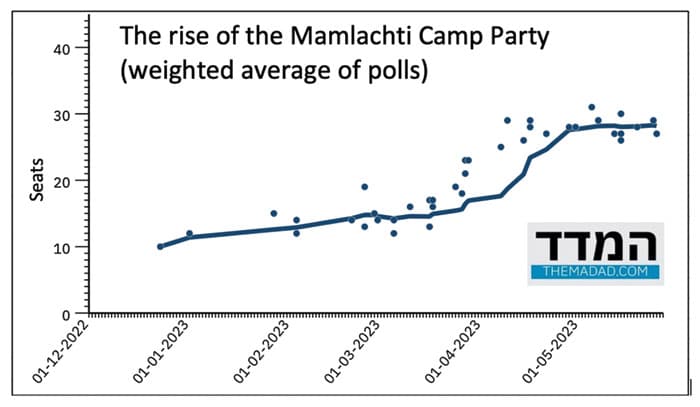
In March, a strange act was exercised by Israel’s government: it raises the possibility of canceling past events by making decisions in the present time. Naturally, it also raises quite a few reflections on the concept of time, the ability to travel back in time, the possibility of changing the future through a journey to the past.
Apparently — it’s possible. All of the above is possible. Proof: on Sunday night, a convoy of mobile homes was making its way in Samaria. Yeshiva students ceremoniously built a permanent residence for their place of study in Homesh in the West Bank, thus, undoing a component of the 2005 plan of “disengagement”. Israel is not (yet?) returning to the evacuated Gaza strip, but it is giving license to settlers to reestablish a permanent residence in northern Samaria, approved by Defense Minister Yoav Gallant.
You are probably familiar with the paradox of traveling back in time, which physicists and philosophers have grappled with: what if you traveled back in time and accidentally (or intentionally) ran over your grandmother’s mother when she was young, so your grandmother was never born, and therefore neither was your mother, and therefore neither were you — But wait, you’re the one who ran over grandma’s mother … how can all this be?
This is what the government and the settlers are doing: they travel back in time to run over their grandmother. In the specific case of Israel, the cancellation of disengagement is the running over grandmother. Let’s play out the paradoxical scenario: if there was no disengagement, the IDF would still be in Gaza, and so would the settlers. Hamas would not come to power, Gilad Shalit would not be taken hostage, and therefore would not have to be released, there would be no Operation Protective Edge. The Kadima party would not be established, nor decline. Ariel Sharon would remain Likud chairman, and so on.
Of course, if it turns out that it works, that it’s really possible to undo past events, it would be a shame not to cancel other troubling events. The potential is endless, and only humorless Americans can’t see it. When the Knesset canceled disengagement, the Biden administration summoned the Israeli ambassador, Mike Herzog, for a serious talk. The Washington fools can’t keep up with Israeli innovation. They thought that the fact that disengagement had already happened made it a fait accompli. Or maybe they just got scared: If Israel has such technological edge up its sleeve, that could undo the past, what else could it undo — the Louisiana Purchase (1803)? the surrender at Appomattox (1865)?
More seriously, the official reestablishment of the Homesh Yeshiva (there were impermanent tents, now there’s license for more) should be addressed by looking at it three different ways. The first is the issue of price: how much would this cost in diplomacy and blood? International condemnation is a given. But Israel isn’t worried about condemnation (the international community can blame itself for such indifference – Israelis got immune to it by being exposed to loads of unfair and imbalanced condemnation). It is only worried about practical consequences. And about the possibility of violence. If Homesh becomes the trigger of violent response, some Israelis are likely to raise the question of benefit and reward.
A second issue is the one of psychological bandage. Israel’s right was traumatized by disengagement and is constantly looking to reverse its consequences. Some rightists dare to dream about returning to Gaza, but such move would not get the nod from most Israelis. A return to Homesh? That’s easier, both operationally and politically. If this serves to heal the right from its disengagement obsession, that could have a certain benefit. Alas, it is more likely to increase the appetite of those wanting to undo the past, rather than satisfy their hunger.
At some point, someone must address the question of endgame by explicitly explaining how an arrangement that includes a Jewish State and alongside it a few million Palestinians might look like.
Then there’s the third issue — the long-term plan of the hard right. A return to Homesh is supposed to be a prelude for more settlement in more distant places. It is supposed to be a prelude for continuing a process whose end-goal isn’t clear. True, a two-state solution is not in the offing. True, the Palestinians can’t be trusted to keep a secure territory. True, Samaria is part of the ancient Jewish homeland. And yet, at some point, someone must address the question of endgame by explicitly explaining how an arrangement that includes a Jewish State and alongside it a few million Palestinians might look like.
A return backward in time does not provide a clue. A return to Homesh does not provide a clue. In fact, it makes the future a tad more mysterious, and hence frightening.
Something I wrote in Hebrew
Another day, another attempt by the government to pass a decision that is unfathomable. Here’s what I wrote:
In a proposed government decision, that the Attorney General opposes, state offices will be required to give “significant weight to the values of Zionism … first and foremost in the areas of settlement and in the provision of benefits to those who served in the army and security forces or in civilian national service … this, without deviating from the principles enshrined in other basic laws”. Well – what does such decision mean? What are “benefits,” what is “preference,” and how can these be given “without deviating from the principles of other basic laws”? Above all: What are the “values of Zionism”?
A week’s numbers
A reward for being moderate, polite, uncontroversial, calm – amid Israel’s chaos.

A reader’s response:
Responding to something I wrote about the power of ultra-Orthodox parties in Israel, Fabian Pascal has this to say: “the problem is the fractured nature of Israeli society and the electoral system that reinforces it which induces a secular coalition to give in to blackmail to get and stay in power”.
Shmuel Rosner is senior political editor. For more analysis of Israeli and international politics, visit Rosner’s Domain at jewishjournal.com/rosnersdomain.


































 More news and opinions than at a Shabbat dinner, right in your inbox.
More news and opinions than at a Shabbat dinner, right in your inbox.